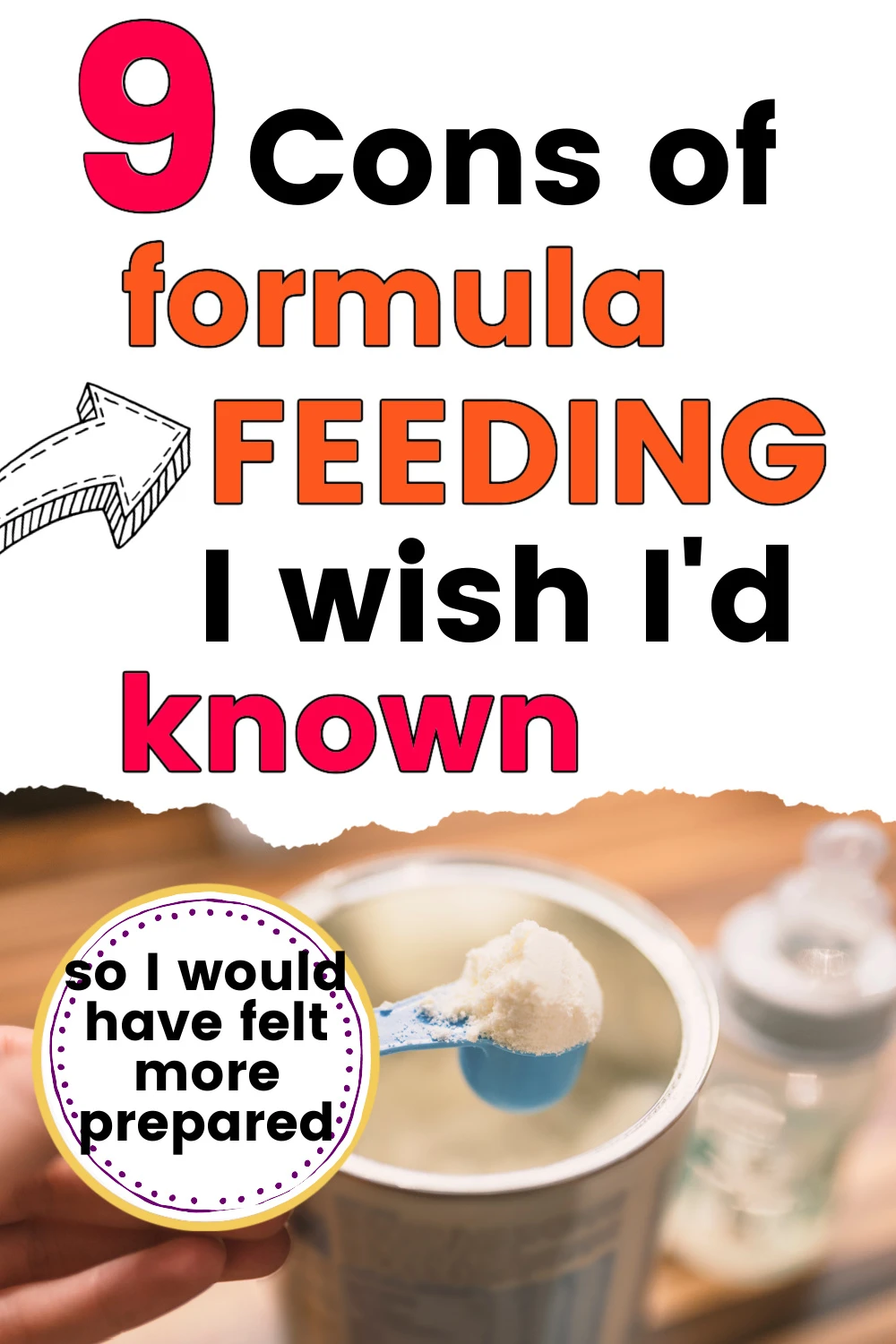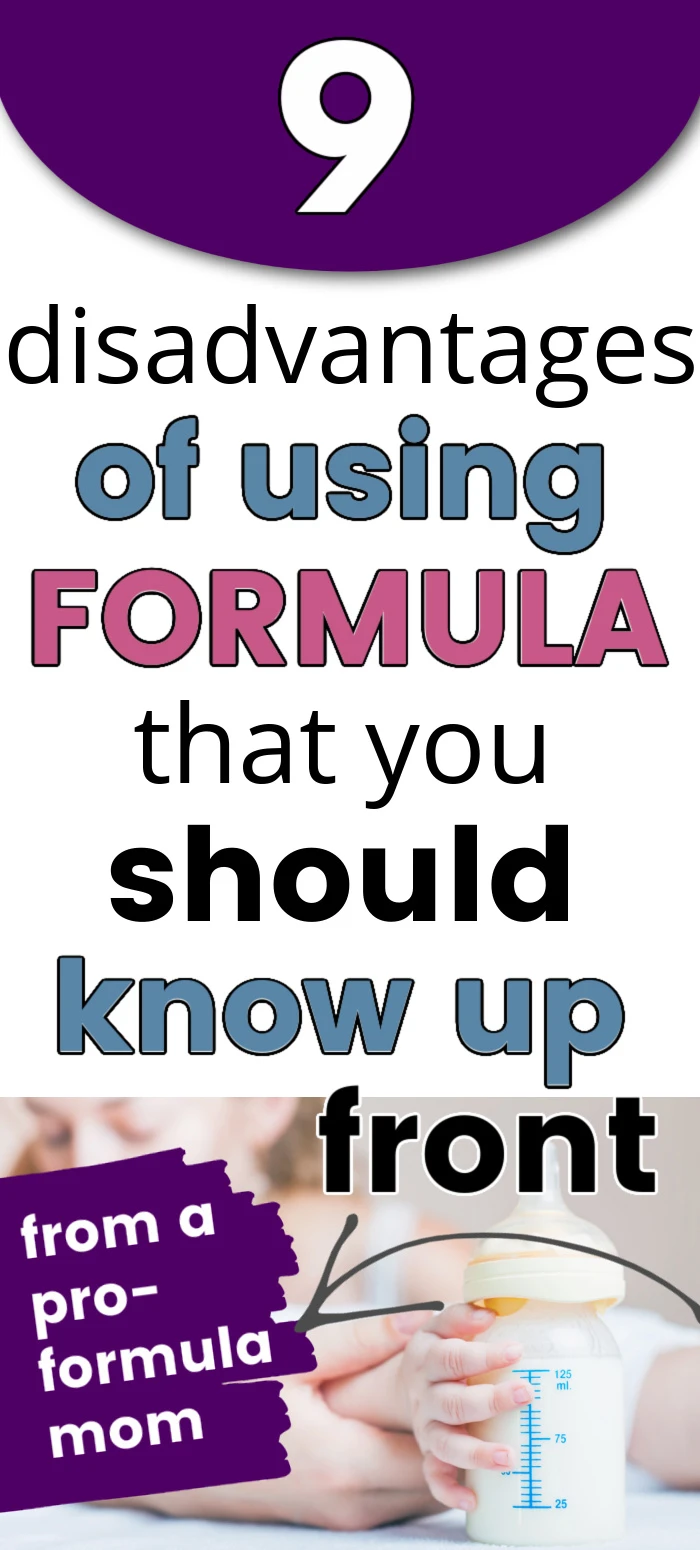Inside: Trying to decide whether or not to use formula? While we firmly believe that fed is always best, there are definitely disadvantages to using formula. To know what you are getting yourself into, here are the top nine disadvantages of formula feeding – from a mom who used formula with both of her babies.
“Should I breastfeed or formula feed?” This is one the many controversial questions expectant moms face during pregnancy.
As if there aren’t enough controversial decisions!
Breastfeeding moms revisit this question when they want to stop breastfeeding, but they’re wondering just how much of a pain formula feeding really is.
Honestly, whatever feeding choice works the best for you and your baby is the right one.
But it can be a difficult decision to make, since both feeding options have pros and cons. And you’re here because you want an honest conversation about the cons.
Please hear me: I formula fed both my babies for various lengths of time. There are definitely benefits to formula feeding.
But in the spirit of honesty…there are also several disadvantages to formula feeding.
Related: How to Ditch Formula Feeding Guilt for GOOD

9 Disadvantages of Formula Feeding
THIS POST PROBABLY CONTAINS AFFILIATE LINKS. AS AN AMAZON ASSOCIATE, I EARN FROM QUALIFYING PURCHASES. YOU CAN READ OUR FULL DISCLOSURE POLICY HERE.
As a formula-feeding mama (times two), I’m sharing from my own experiences. This is what I would have wanted to know before I started using formula, even if I was set on formula feeding from the start.
If you are thinking about formula feeding, here’s what you should know before you make the decision, and if you’ve already officially decided to formula feed, what to expect before you start.

1. Formula can be expensive.
One of the biggest and most obvious disadvantages of using formula is the cost.
You have probably heard breast milk referred to as “liquid gold.” Formula could easily be called liquid gold for a different reason!
Unfortunately, it can be quite pricey. Move over diapers – formula beats you be a long shot.
The amount of money you will spend on formula will vary, depending on which type your baby requires and which brand you choose to use.
If your baby doesn’t have any tummy issues, you can try using a generic brand of formula. Using a generic brand versus a name brand can save you a little bit of money.
If your babe does has a sensitive tummy or a protein allergy, she might need a specialized formula. Those can cost quite a bit more.
I would recommend budgeting at least $100 for formula each month (and more if your baby ends up needing a specialized formula).
If cost is a concern, to the point of wondering whether or not you will be able to feed your baby (or yourself), see if you qualify for the WIC program, which can help cover the cost of formula.
2. As if the cost of formula wasn’t enough, you’ll also need to buy bottles and other formula-feeding supplies.
Along with buying formula, you will also need a variety of supplies.
First, you will need bottles of various sizes—smaller bottles to start and larger bottles as baby grows. Along with several bottles, you will need to have nipples with different flows (slow to start and medium to fast as baby grows).
You will also need cleaning supplies for bottles and nipples. A bottle brush is a must.
Other items that make cleaning much easier are a bottle drying rack, microwaveable sterilizing bags, and a nipple holder for the dishwasher.
Another item I would recommend is a smaller formula container for on-the-go feedings. You won’t want to lug around a regular size can of formula in your diaper bag.
The cost of all of these supplies can add up quickly!
Related: Bottle Feeding Essentials – What You Truly Need & What to Skip
3. You will be washing 8+ bottles every single day. Need I say more?
Babies, especially in the early months, go through several bottles each day. Once formula has been mixed up, it is recommended that any unused formula be thrown away. This means you will need to make a fresh bottle for each feeding.
New parents already have enough on their plates. Honestly, having to wash bottles at the end of a long day (or in the middle of the night) is the last thing you will feel like doing. But baby’s gotta eat...
Bottles also have multiple pieces that must be taken apart before washing and then reassembled after.
Washing bottles every single day takes up more time than you might think!
4. You also need to pack and carry around all of those supplies.
With breastfeeding, feeding your baby when you are away from your home is fairly simple. With formula feeding, you must always plan ahead – ALWAYS.
You will need to pack clean bottles, formula, and water (if no clean water will be available).
When traveling long distances or staying at hotels, you will need to pack cleaning supplies as well, at the very least a bottle brush and clean towels to dry everything on.
Extra formula is a must, too, in case you are out longer than expected or a bottle is accidentally spilled.
Feeding your baby away from your home is more complicated with formula, compared to breastfeeding.
Related: 5 Essential Tips for Formula Feeding on the Go
5. Then there’s the time it takes to prepare a bottle.
While I’m so thankful for formula, formula feeding takes more time. Period.
With breastfeeding, you can literally have your baby eating within seconds. This is especially handy when you have a crabby, hungry baby on your hands!
With formula feeding, it just isn’t as easy. You have to measure out each formula dose, add just the right amount of water, mix it thoroughly, etc.
There will always be these extra steps that will need to be taken before each formula feeding.
Also, breastfeeding mamas don’t have to worry about accidentally running out of milk, whereas formula feeding mamas need to remember to have a supply of formula at all times.
There is nothing like the horrified feeling that comes over you when you have a very hungry, unhappy baby and realize there isn’t another can of formula in the pantry or your diaper bag!
Related: Formula Feeding Tips and Tricks That’ll Make You a PRO
6. Constantly adjusting formula requirements as your baby grows can be overwhelming.
As long as they are properly gaining weight, breastfeeding mamas usually don’t need to spend much time worrying about how much their baby is eating during each feeding.
The nutritional content of breast milk changes according to what babies need as they grow, and breastfed babies generally eat as much as they need to.
Formula feeding can be a little bit trickier.
While it is nice to know exactly how much your baby has eaten, it can be challenging to know how much formula should be given at each feeding. There are general feeding guidelines for each age, but every baby has different, individualized needs.
Formula feeding moms need to constantly make adjustments as their babies grow, and constantly evaluate if more or less formula is needed (especially since you don’t want to waste a drop!), and that can feel a little overwhelming.
Finding formula-feeding support can be challenging, too, depending on where you live.
There aren’t as many resources or groups for formula-feeding moms as there are for breastfeeding moms. Formula feeding can feel a little intimidating and isolating at times.
7. Middle of the night feedings are a [bigger] pain.
Breastfeeding mamas are able to start feeding their babies within seconds of picking them up. Formula feeding mamas have to mix up a bottle before every feeding or heat up pre-made bottles of formula, which all takes time.
There also isn’t an option of doing side-lying feeding during night feedings.
Formula mamas need to feed their babies sitting up, just as they normally would during the day. And after having to be up moving around for each feeding session, it can be harder for you to fall back to sleep.
Thankfully, dad or other caregivers can share middle of the night feedings.
8. Formula diapers and spit-up smell HORRIBLE.
As probably any formula mama can tell you, the smell of formula is not all that appealing (and some types are way worse than others).
While breastfed babies typically have diapers that don’t have much of an odor, diapers from formula-fed babies can be quite stinky.
Formula spit-up is almost as bad.
While this isn’t a deal breaker, just be prepared!
9. You don’t get the calorie-burning benefit of breastfeeding. Boo.
Breastfeeding can burn hundreds of calories a day. This can make losing any extra pregnancy weight a bit (or a lot) easier.
While this isn’t an issue for everyone, trying to get back to a healthy weight after having a baby can be a struggle for some mamas.
Most doctors will recommend waiting until the 6-week postpartum check up before resuming any exercise routines, so breastfeeding can help jump start weight loss after pregnancy.
And let’s be honest, it can be hard to find the time or energy to exercise with a new baby at home, even after you have been given the clearance to do so.
Related: 12 Legitimate Reasons to Stop Breastfeeding (and not feel guilty)

But Your Mental Health Matters More Than All of These Formula-Feeding Disadvantages Combined
So many factors will go into your decision on whether or not to formula feed. Truly, there is no one right answer!
(And if anyone tells you there is one right answer, run – far, far away.)
Everyone’s situation is different, and you should make a choice that is right for you and your baby.
I will say that the one thing you can’t put a price on, that deserves some extra weight in either the pro or the con column for this decision is YOUR mental health.
If you’re constantly dreading breastfeeding or formula feeding, feeling guilty about one or the other, or just weighed down by your current feeding choice, pay attention to those feelings.
If you hate breastfeeding, or it’s causing you pain or mental distress in any way, all of these disadvantages of formula feeding? They won’t really matter if using formula makes you a happier mom.
Your mental health matters as much as – or more than – what you feed your baby. Happy moms are less prone to postpartum depression and a variety of other issues.
If you need to formula feed, you’ll figure out how to come with all of these disadvantages, just like breastfeeding moms figure out how to deal with the disadvantages of breastfeeding.
Whatever you decide to do, always remember that whether you end up formula feeding or breastfeeding, fed is BEST.
If your baby is loved and cared for, and that’s what matters most.
Read Next: The Benefits of Formula Feeding for Mom I Wish I’d Known
Mary Ann Blair is a stay-at-home mom living in the Pacific Northwest with her two little gentlemen and hubs. She loves connecting with other parents who like to keep it real!
Her writing has been published on Her View From Home, Perfection Pending, That’s Inappropriate, Pregnant Chicken, Sammiches and Psych Meds, Red Tricycle and in Chicken Soup For the Soul. She can be found at https://www.maryannblair.com